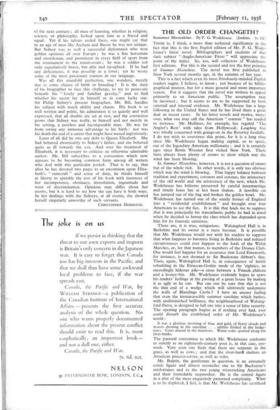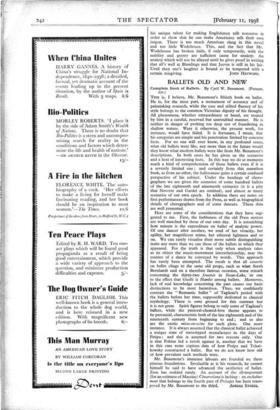THE OLD ORDER CHANGETH ?
Summer Moonshine. By P. G. Wodehouse. (Jenkins. 7s. 6d.)
THERE is, I think, a more than technical significance in the fact that this is the first English edition of Mr. P. G. Wode- house's latest novel. Bibliographers and students of that dark subject " Anglo-American Firsts " will appreciate the point of the italics. So, too, will collectors of Wodehouse first editions. For this is the second and not the first printing of Summer Moonshine. The novel was first published in New York several months ago, in the autumn of last year.
This is a fact which even its most frivolously-minded English readers ought, I believe, to know ; not because of its biblio- graphical interest, but for a more general and more important reason. For it suggests that the novel was written to appeal primarily to an American public. The assumption may be incorrect ; but it seems to me to be supported by both external and internal evidence. Mr. Wodehouse has a large following in the United States and he has lived there a great deal in recent years. In his latest novels and stories, more- over, what one may call the American " content " has tended to increase. Mr. Mulliner, for example, has regaled `The Angler's Rest' with tales from Hollywood; Laughing Gas was wholly concerned with goings-on in the Beverley foothills. I do not wish to overstress this point, for it is a long time since Mr. Wodehouse began making capital, so to speak, out of the legendary American millionaire ; and it is certainly ages since Bertie Wooster first visited New York. There have always been plenty of straws to show which way the wind has been blowing.
In Summer Moonshine, however, it is not a question of straws but of the whole rick. In other words, it is only too obvious which way the wind is blowing. That happy balance between tradition and experiment, coronets and coronas, the aristocracy of the old world and the aristocracy of the new, which Mr. Wodehouse has hitherto preserved by careful intermarriage and timely loans has at last been shaken. A horrible cat has jumped out of the bag and broken the golden bowl. Mr. Wodehouse has turned one of the stately homes of England into a " residential establishment " and brought over four Americans to see the fun. It is this that leads me to suppose that it was principally his transatlantic public he had in mind when he decided to betray the class which has depended upon him for its fantastic existence.
There are, it is true, mitigations. Walsingford Hall is in Berkshire and its owner is a mere baronet. It is possible that Mr. Wodehouse would not wish his readers to suppose that what happens to baronets living in Berkshire and reduced circumstances could ever happen to the lords of the Welsh Marches, or, for that matter, to members of the Drones Club. One would feel happier for an assurance that Lord Emsworth, for instance, is not doomed to Sir Buckstone Abbott's fate. Then, again, Walsingford Hall is, in consequence of lavish rebuilding in the Etruscan-Gothic mode of the 'eighties, an exceedingly hideous pile—a cross between a French-:-chiteau and a looney-bin. Mr. Wodehouse evidently hopes to spare his readers' feelings at the passing of a great house by making it as ugly as he can. But can one be sure that this is not the thin end of a wedge which will ultimately undermine the walls of Blandings Castle ? I have an uneasy feeling that even the immarcescible summer sunshine which bathes, with undiminished brilliance, the neighbourhood of Walsing- ford Parva, is designed to lull one into a sense of false security. The opening paragraph begins as if nothing ever had, ever could disturb the established order of Mr. Wodehouse's world :
It was a glorious morning of blue and gold, of fleecy clouds and insects droning in the sunshine . . . rabbits frisked in the hedge- rows. Cows mused in the meadows. Water voles sported along the river-banks.
The pastoral convention to which Mr. Wodehouse conforms as strictly as an eighteenth-century poet is, in this case, eye- wash. Very soon one finds that there are serpents in the grass, as well as cows ; and that the river-bank shelters an American process-server, as well as voles.
Mr. Bulpitt, the gentleman in question, is an extremely comic figure and almost reconciles one to Sir Buckstone's misfortunes and to the two young wisecracking Americans and their formidable stepmother. He is the central figure in a plot of the most exquisitely patterned complexity. What is to be deplored, I feel, is that Mr. Wodehouse has sacrificed his unique talent for making Fnglishmen talk nonsense in order to show that he can make Americins talk their own jargon. There is too much American slang in this novel and too little Wodehouse. This, and the fait that Mr. Wodehouse has broken faith, if only temporarily, with the nobility and gentry are sufficient cause for anxiety. An anxiety which will not be allayed until he gives proof in writing that all's well at Blandings and that Jeeves is still in his lair. Until then one's laughter is bound to be tempered with a



















































 Previous page
Previous page